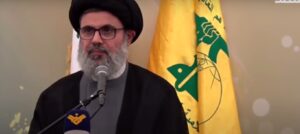As the conflict continues, disputes have already surfaced within Israel and between Israel and the U.S. regarding the post-Hamas era in the Gaza Strip.
The U.S. stands firm in its support for the PA to govern the territory, emphasizing the need for a unified Palestinian entity in both the Gaza Strip and Judea and Samaria.
This, according to the Biden administration, sets the stage for renewed negotiations toward a permanent solution, culminating in the establishment of an independent Palestinian state alongside Israel.
However, tensions have escalated due to Prime Minister Netanyahu’s declaration that Israel will maintain security control over the Gaza Strip, resisting the return of the PA.
The U.S. administration, outraged by this stance, plans to seek clarification from Israel regarding the Prime Minister’s remarks.
Netanyahu’s opposition stems from the PA’s failure to condemn a brutal Hamas massacre on October 7 and its continued financial support of terrorists, contributing to ongoing violence.
Israeli political officials argue that the Biden administration hastily formed its position without full coordination with Israel.
They contend that the PA’s weaknesses, corruption, and unpopularity among Palestinians make it an ineffective choice for governing the Gaza Strip.
Hamas, on the other hand, openly expresses its intention to reclaim control after the conflict.
A senior Hamas official, Osama Hamdan, asserts that only the residents of the Gaza Strip should govern it, hinting at potential resistance to foreign political or security authority.
While Israel’s position appears varied, with conflicting statements from different officials, it leans toward a more cautious approach. Israel’s ambassador to Washington, Mike Herzog, suggests that Palestinians must govern themselves in the Gaza Strip, with the PA undergoing necessary reforms.
In contrast, the head of the opposition, Yair Lapid, supports the PA assuming control, but with immediate security oversight by the IDF.
The return of the PA to the Gaza Strip would necessitate a substantial deployment of security forces and a gradual process, including the training of personnel in Jordan.
However, the feasibility of this approach is uncertain given the current challenges faced by the PA.
The prospect of holding general elections to choose new Palestinian leadership is deemed unviable by Israel, the PA, and the international community, as polls indicate an expected victory for Hamas.
Consequently, the responsibility of maintaining security in the Gaza Strip and preventing Hamas resurgence falls largely on the IDF.
In a significant shift, Prime Minister Netanyahu asserts that the IDF will have supreme security authority in the Gaza Strip after the war.
This implies that IDF forces can enter any part of the territory at any time to combat terrorism, reflecting Israel’s commitment to ensuring its own security.
As differences between Israel and the U.S. regarding the post-conflict scenario intensify, it is evident that deep discussions will be necessary to reach agreements on the future governance of the Gaza Strip.



